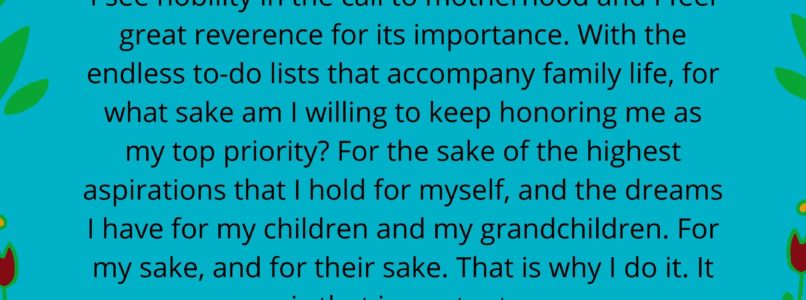 A few years ago, I stopped business building after ten years. I published a book, and I’ve continued to write, but my main focus shifted to caregiving for my family. For now, it’s my calling and mission. My mother has Alzheimer’s and lives with us. My husband has been ill for some time. My daughter works full time, and I get my grands off to school most days and help care for my granddaughter, who has severe Cerebral Palsy. It is a lot. I take it very seriously.
A few years ago, I stopped business building after ten years. I published a book, and I’ve continued to write, but my main focus shifted to caregiving for my family. For now, it’s my calling and mission. My mother has Alzheimer’s and lives with us. My husband has been ill for some time. My daughter works full time, and I get my grands off to school most days and help care for my granddaughter, who has severe Cerebral Palsy. It is a lot. I take it very seriously.
I use prayer to stay focused on what matters and on what to add or delete from my life. It is imperative to receive this help in our busy four-generation household. Without direction, it would be impossible for me to maintain balance. Through prayer, I understood that my mission needed to change from speaking and teaching to caregiving. It was equally clear that I should continue to write my weekly article, post once daily, and work with a few mentees. It wasn’t an easy choice; I LOVED what I was doing but I trust God. So, after agonizing for a few months, I made a leap of faith.
A couple of years passed, and then this spring, I understood that I needed to add two resource sections to my newsletter – Resources Worth Sharing and the Home School Corner. That added to my workload! (By the way, I am always on the hunt for excellent resources to share. Got one? Please send it my way.)
Then, a couple of months ago, I felt prompted to begin making the articles into audios. YIKES!!! I have put it off for a while. I made a few attempts to figure it out but then would let it go in frustration. However, this week I determined to get it done, and after some crying and handwringing, I DID IT!! Can I say that I am over-the-top proud of myself!!
The Purpose
I have asked a few questions as I have implemented these new things:
•Why would I be asked to let go of something I loved and was good at, which impacted others for good? After all, it was my dream and passion.
•Why would God ask me to keep writing and mentoring when life is crazy busy, and it’s easy to feel overwhelmed?
•Why does God keep asking me to learn how to do hard things? Isn’t what I do enough?
•What should I be learning?
In the past two decades, God has asked me to let go of several things that I loved, and which mattered to me. It was never easy to decide, but I did because I trust God. What have I learned from letting go? I have learned that I can make hard decisions even when they fly in the face of what others think I should do. I have learned that life isn’t always about me and what makes me happy. I have learned that when we give something up, we make space for something else. Often it’s of more value than what we gave up.
Every week I get one or more emails from those who read what I write and those I mentor. They consistently relay the message that what I share matters to them, helps, and gives them confidence and hope in their efforts. Every week in my small way, I have an impact.
As for question number three, I have pondered it diligently. Here is what I think. I needed confidence that whatever is required of me, I can learn how to do it! With God, all things are possible. In the coming days and years, this clear belief, backed by my own experience, will help not only me but others. Life can be tough!
I have also learned that when we are faced with something we don’t know how to do or a problem we are unsure how to solve, we need to move. As soon as we take even a small step resources and people that we need begin to come to us. But the key is to move. God can’t steer a parked car.
Another thing, getting older is not easy. Things change, and it’s tempting to begin doubting yourself and your abilities. My memory has become an issue. I will recall your face, but I may not know your name, where we met, or anything about you. If you tell me your name it all comes back. It scares me because I may see you in the future, and despite this current hardship, I want you to know that I am your friend and I love you. It matters to me.
My energy level has changed. I can still work rings around many younger people, but I feel the difference. However, God keeps asking me to learn and grow despite the challenges of aging. He asks me to keep sharing with you. I believe he wants me to remain confident in my ability to impact my small piece of the world for good despite the limitations I may face. We really are never too old to influence others positively. Talking with those I trust has helped me deal with these things.
I am sharing all of this, so you know where I am and why I do what I do. It may help you because what you need to do in your current life may be kicking your butt. : ) Maybe you struggle to do as you feel moved. Perhaps you’re afraid to give up something you love to make space for something new. Perhaps your needs outstrip your current abilities or skills, and you must learn something. Maybe something has changed, and you are scared. Perhaps you need a mentor.
A True Story
This is the process of life. It never stops. It doesn’t matter if you are twenty-five, fifty, or over seventy, like me. We need to keep pushing the boundaries of what we know so we can serve better. We need to be obedient to what our promptings, gut, or thoughts tell us. We need to be willing to go to some scary places. How do I know this? Let me share a story that drove this home to me. I was younger, but I am living the truth of what I learned then.
Marjorie and Marion were eighty-year-old twins. They had both lost spouses and lived together. Every day they took a walk around the block arm in arm.
One day Marion was walking alone, and she was a bit tippy on her feet. I saw her and was worried, so I went out and said, “Marion, can I walk with you.” As we walked, she talked about her life and her sister. They had been fighting, and she was sad. Their relationship had been a mess for a few days. She was trying to figure out what to do about it. She began to cry.
I was stunned!! I couldn’t help myself, and despite her tears, I blurted out, “Marion, I thought when I got to your age, I would have it all worked out!”
Through her tears, she began laughing – “Oh goodness honey, that will never happen. There is always something to work on!”
So, take heart. You are not yet eighty, and so as Marion said, “There is always something to work on!”
Addendum
Because I keep learning hard things, here is what is new as of today. Each weekly article has a featured image. When you click on the Go To The Article link it will take you to the website. Please note that in the corner of the featured photo you will see a small sound icon. Click it and voila, you can listen to today’s article. You will also see a soundbar at the end of the article on both the website and in this newsletter. Again, you can listen in. God knows that you are busy and that sometimes listening is more accessible than reading. That is why he had me learn this new, hard thing!
Here is the caveat. I won’t be doing any fancy editing. I won’t be taking out all the little mistakes—no musical introduction. No logo. Just me, a busy mom, grandmother, and caretaker, sharing with you. You get what you get. I hope it will be enough and that you and I can continue to learn from one another as we share our experiences.
Listen, I never give up until I learn how to do what is required. You do the same and if you do it will be enough. : )


 I recently finished reading The Choice. The author, Dr. Edith Eva Eger, spent part of her teen years in Auschwitz. She shares things she learned while there, after she left, and while working as a psychiatrist with other trauma victims. It was gut-wrenching and not a pretty read. I had to endure a bit of foul language. It went with the territory.
I recently finished reading The Choice. The author, Dr. Edith Eva Eger, spent part of her teen years in Auschwitz. She shares things she learned while there, after she left, and while working as a psychiatrist with other trauma victims. It was gut-wrenching and not a pretty read. I had to endure a bit of foul language. It went with the territory. Mary, was six, she loved to watch the fish in our tank. We have a very sleek, silver catfish that swims fast and erratically whenever anyone stands in front of the tank. I believe the fish does this out of fear or because it has been disturbed.
Mary, was six, she loved to watch the fish in our tank. We have a very sleek, silver catfish that swims fast and erratically whenever anyone stands in front of the tank. I believe the fish does this out of fear or because it has been disturbed.

 music and the dancing that brought the spark to the surface. But it wasn’t. Remember that talk I had with God? I didn’t just complain about loss, age, passing time, etc. I asked what I could do to feel ‘in love.’ Not only “I care” or “I love you,” but ‘in love.” If you’ve been there, then you know what I am talking about.
music and the dancing that brought the spark to the surface. But it wasn’t. Remember that talk I had with God? I didn’t just complain about loss, age, passing time, etc. I asked what I could do to feel ‘in love.’ Not only “I care” or “I love you,” but ‘in love.” If you’ve been there, then you know what I am talking about. It has been a few days since the miracle and Don, and I are still connecting in small ways. We are talking more softly and listening more intently. Saturday afternoon, while our granddaughter Maggie watched Mother Goose Playhouse, we held hands and danced in place for just a moment. : ) If I keep focusing on his strengths and gifts and keep thanking him for them, it will last.
It has been a few days since the miracle and Don, and I are still connecting in small ways. We are talking more softly and listening more intently. Saturday afternoon, while our granddaughter Maggie watched Mother Goose Playhouse, we held hands and danced in place for just a moment. : ) If I keep focusing on his strengths and gifts and keep thanking him for them, it will last.




 Two years ago was my 50th high school reunion. I didn’t go. Our family was moving into a new home. The reunion was in Greeley, Colorado, a whole different state. I only went to Greeley West High School for my senior year, and I never really connected. I had friends and was involved on the school radio, worked on the yearbook, did a couple of plays, etc. I was involved but hovered in the background. Just my face in the yearbook.
Two years ago was my 50th high school reunion. I didn’t go. Our family was moving into a new home. The reunion was in Greeley, Colorado, a whole different state. I only went to Greeley West High School for my senior year, and I never really connected. I had friends and was involved on the school radio, worked on the yearbook, did a couple of plays, etc. I was involved but hovered in the background. Just my face in the yearbook.
 It has been three weeks, and you haven’t heard from me.
It has been three weeks, and you haven’t heard from me.





 My sister uses only white dishcloths. When they are soiled, she boils them on the stove until they are white – I mean white! There is not a stain on them. When they begin to fray or wear out, they end up in the rag bag or the garbage.
My sister uses only white dishcloths. When they are soiled, she boils them on the stove until they are white – I mean white! There is not a stain on them. When they begin to fray or wear out, they end up in the rag bag or the garbage.